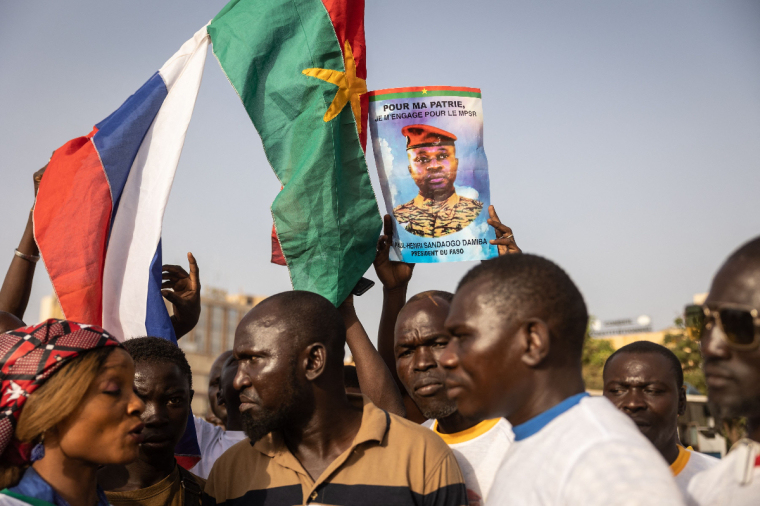Burkina Faso coup leader sworn in as president, vows to defeat Islamic extremism.
 Demonstrators hold a photo of Lieutenant Colonel Paul-Henri Sandaogo Damiba the leader of the mutiny and of the Patriotic Movement for the Protection and the Restauration (MPSR) as they gather to show support to the military in Ouagadougou, on February 19, 2022. (Photo by OLYMPIA DE MAISMONT / AFP) (Photo by OLYMPIA DE MAISMONT/AFP via Getty Images) | Olympia De Maismont/AFP via Getty Images
Demonstrators hold a photo of Lieutenant Colonel Paul-Henri Sandaogo Damiba the leader of the mutiny and of the Patriotic Movement for the Protection and the Restauration (MPSR) as they gather to show support to the military in Ouagadougou, on February 19, 2022. (Photo by OLYMPIA DE MAISMONT / AFP) (Photo by OLYMPIA DE MAISMONT/AFP via Getty Images) | Olympia De Maismont/AFP via Getty ImagesBurkina Faso coup leader Paul-Henri Damiba has been sworn in as president and vowed to win the war on Islamic extremism that has plagued the country in recent years, leading the U.S. government to restrict $160 million in aid.
“To ... gain the upper hand over the enemy, it will be necessary ... to rise up and convince ourselves that as a nation we have more than what it takes to win this war,” Damiba said at the swearing-in ceremony Wednesday, Reuters reported.
Once considered relatively peaceful, Burkina Faso has seen an exponential rise in Islamic terrorism since 2016 that has led to the displacement of over 1.5 million people. The United Nations stresses that a 50% rise in internal displacement in the former French colony in 2021 is the “highest proportions of internal displacement on the continent.”
Since 2016, there has been an increase in Islamic State fighters fleeing from the Middle East to Africa, which has led to a sharp rise in extremism across the Sahel and other regions in Africa.
To fight extremism, Damiba said, he would improve the coordination between the armed forces and the intelligence service. He vowed to make logistical support more flexible.
Damiba was a lieutenant colonel who commanded the military region in charge of protecting the national capital, Ouagadougou. He serves as head of the Patriotic Movement for Safeguard and Restoration, which oversaw the Jan. 24 coup overthrowing President Rock Kabore’s administration in response to an inability to thwart extremist violence.
The new president has said he would work with the Economic Community of West African States to make sure that the country returns to democratic elections.
After last month’s coup, the ECOWAS suspended Burkina Faso from its governing bodies.
During the January coup attempt, Kabore’s political party headquarters was burned and looted by protesters as gunshots rang out at military bases around the city.
On Friday, the U.S. State Department spokesperson confirmed that $158.6 million in foreign assistance that benefits the government of Burkina Faso will be restricted under a U.S. law that prohibits foreign aid from going to countries where a military coup has overthrown a country’s elected leader.
According to Reuters, the State Department stated in a notice to Congress that it would try to work around the aid restrictions in light of U.S. national interests and to provide humanitarian assistance to those impacted by the conflict.
Since 2020, coups takeovers have occurred in African countries Mali, Guinea and Chad.
The rise of extremism in Burkina Faso has caused international concern, with the U.N. vowing in 2020 to step up its response after displacement in Burkina Faso rose 1,200% in 2019.
The U.S. State Department created a special envoy position to maximize U.S. diplomatic efforts to address the terror threats in the region, which have also impacted countries like Cameroon, Mali and Niger.
Both Muslims and Christians bear the brunt of Islamic extremism in Burkina Faso. According to the Pew-Templeton Global Religious Futures Project, Christians comprise just over 20% of Burkina Faso’s population, while Muslims make up over 60%.
In its "Persecution Trends 2022" report, Release International said, “The situation facing Christians in Burkina Faso is now similar to Nigeria,” where terror groups like Boko Haram and Islamic State West Africa Province have killed thousands and displaced millions.
In 2021, jihadis targeted Christians in the north of Burkina Faso, forcing churches to close and meet in secret, the report notes. The attacks ranged from bombings, killings, kidnappings and school burnings to assaults on religious leaders and places of worship.
Pressure in the region is likely to continue in 2022, particularly following the drawdown of French troops in the area, Release International warned.
Open Doors USA, which monitors Christian persecution in over 60 countries, ranks Burkina Faso No. 32 on its 2022 World Watch List of countries where its hardest to be a Christian.
In a January 2022 report, Open Doors warned that the impact of Islamic extremism has expanded as jihadis have made their influence felt “even in cities that had previously been beyond their reach.”
Militant groups that operate in Burkina Faso include Jamaat Nusrat al-Islam wal Muslimeen, Islamic State West Africa, Islamic State Greater Sahara, al-Qaeda in the Islamic Maghreb, al-Murabitoun, Ansar Dine and Boko Haram.
“Christians have been targeted and killed and churches have been destroyed,” the report states. “Christians of Muslim background are the most persecuted Christian group in the country. Similar attacks in Niger, Mali and the greater Sahel region is making the situation in Burkina Faso very serious. Christians have been targeted in villages, churches and workplaces. Hundreds of churches have been closed due to jihadist activities.”
According to the U.N., the Sahel region is facing an “unprecedented rural exodus” as many displaced people are “moving to urban areas under governmental control.
Boris Cheshirkov, a spokesperson for the U.N. High Commissioner for Refugees, told reporters last month that Burkinabe refugees have told UNHCR staff that “civilians had been killed and their homes burnt down by extremists.” CP.
.jpeg)